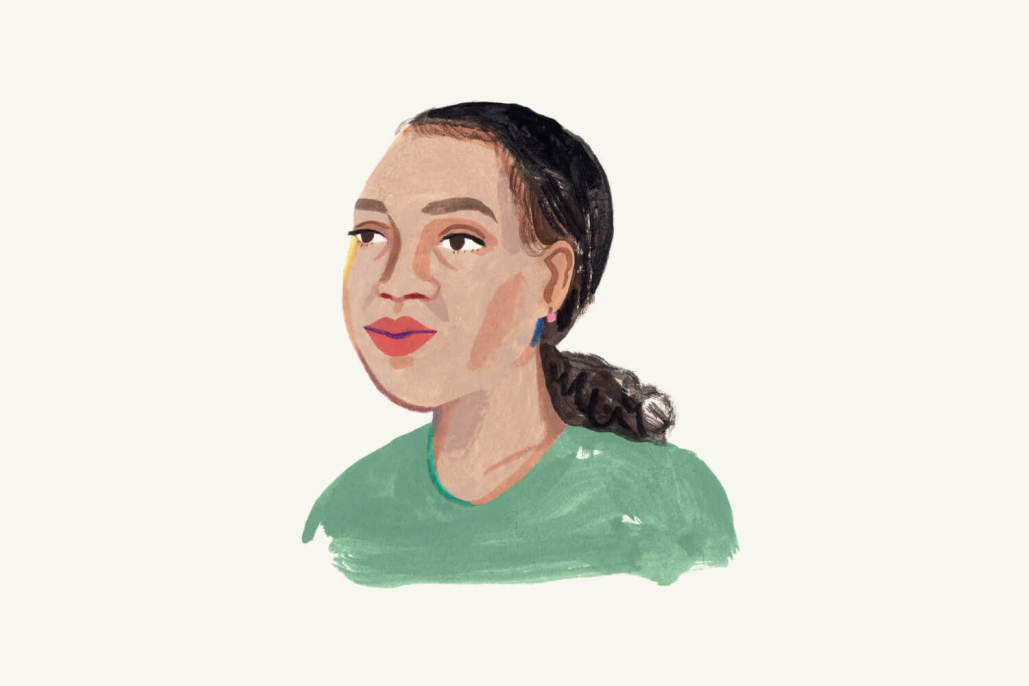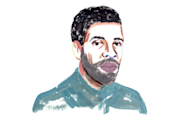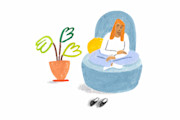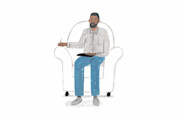Over 50 million Americans of all races and ethnicities—Black, White, Asian American, Hispanic, and Native American—experienced some type of mental disorder last year.
Yet, in many mental illness measurements, including suicidal ideation, alarming increases have been seen among the African American community.
Americans' searches for Black therapists have risen substantially.
For example, in 2020 Mental Health America (MHA) analyzed over one million U.S. mental health screenings and found the largest increases in suicidal ideation among Black Americans and Native Americans.
In 2019, the prior year, suicide was already the second leading cause of death for African Americans aged 15-24 years old.
Data from the Centers for Disease Control and Prevention (CDC) 2018 National Health Survey showed 4% of Black Americans reporting general sadness, compared to 2.6% of White Americans.
In 2019 suicide was the second leading cause of death for African Americans ages 15-24.
What's more, a 2021 meta-analysis concluded that nearly 15% of Black Americans may have symptoms of ADHD.
And, while ADHD is impacting a higher percentage of African Americans than any other U.S. racial and ethnic group, research shows Black children and adults are less likely to get access to official ADHD diagnoses and treatment.
Only 8% of African Americans accessed mental health services, compared to 16% of White Americans and 15% of Native Americans, according to a 2015 report.
Several factors contribute to this disparity.
Unequal access to health care coverage and access to affordable therapy sessions is one factor.
Even after the Affordable Care Act—15% of Black Americans still did not have health insurance coverage as compared to 9% of White Americans, and 8% of Asian Americans—according to 2016 CDC survey data.
The lack of Black therapists is another barrier to Black Americans' access to therapy and mental health support. We'll go into reasons for this in more depth later in this article.
That this lack of African American counselors has an impact is underscored by comments psychiatrist Christine M. Crawford, M.D., MPH, shared with Boston's McClean Hospital in 2022.
The “lack of cultural sensitivity by [non-Black] health care professionals and African Americans feeling marginalized" are additional barriers keeping Black Americans from mental health support, Crawford points out.
Why Black therapists are essential
For many people—and particularly many Black Americans—finding a Black therapist nearby, who they can trust, holds extra importance.
One-fifth (19%) of Black MHA survey participants with moderate to severe mental health conditions mentioned racism as one of their top three concerns in 2020 (in the months following the murders of George Floyd and Ahmaud Arbery).
In 2015 only 8% of Black Americans accessed mental health services, compared to 16% of Whites.
Acknowledging this reality makes the findings of a 2013 study resonate even more loudly.
This particular study followed 102 Americans in mental health treatment, and the researchers discovered clients from ethnic minority groups viewed issues regarding race and ethnicity as more important than White clients did.
In fact, when these cultural elements were not included in their therapeutic care, people of color were less satisfied with their mental health treatment.
The study's authors concluded that culturally relevant aspects of the therapy and mental health experience are integral to Black, Brown, and Indigenous people of color.
What's more, the inclusion or exclusion of culturally relevant elements were found to affect how people of color respond to mental health services.
With all this in mind, it may not be surprising to see Americans' online searches for Black therapists have risen substantially over the past seven years, according to 2022 Google Trends data.

There is an unquestionably urgent and crucial demand for more Black psychologists and counselors.
Beyond the difficulty of finding Black therapists with availability, at least one study also suggests it's less accessible, in general, for Black therapy seekers to successfully book appointments with psychotherapists over the phone.
Research published in 2016 in the Journal of Health and Social Behavior utilized a phone-based field experiment to investigate the impact of mental help seekers’ race, class, and gender on the accessibility of psychotherapists.
In the experiment, 320 American psychotherapists each received voicemail messages from two Black therapy seekers and two White therapy seekers requesting appointments.
There is an unquestionably urgent and crucial demand for more Black psychologists and counselors.
The study found Black middle-class mental health help seekers were considerably less likely to be offered psychotherapy appointments over the phone than their White counterparts.
According to the study's author Heather Kugelmass, Ph.D., "The results revealed an otherwise invisible form of discrimination."
The lack of Black therapists contributes toward the challenges Black Americans face in accessing therapy and mental health care, and it undermines the overall ability of the U.S. healthcare system to serve the needs of all citizens.
Thought leaders are taking notice.
Therapy for Black Girls is an online community created with the express purpose of making mental health topics more "relevant and accessible for Black women.”
Read on, and we'll examine possible reasons contributing to the current lack of African American psychologists and counselors.
We'll also provide helpful information on how to find a Black therapist, along with links to Black therapists with availability and online booking.
What percentage of therapists are Black?
While Black Americans make up 12% of the U.S. population, according to the American Psychology Association (APA) Datapoint—as of 2015—only 4% of American psychologists were Black whereas 86% were White.
In comparison, 5% of the psychologists were Asian, 5% were Hispanic, and 1% were multiracial or from other racial and ethnic groups.
A SimplePractice 2021 “State of the Mental Health Profession” survey of over 2,400 U.S. therapists in private practice found that 6% of therapists who responded are Black.
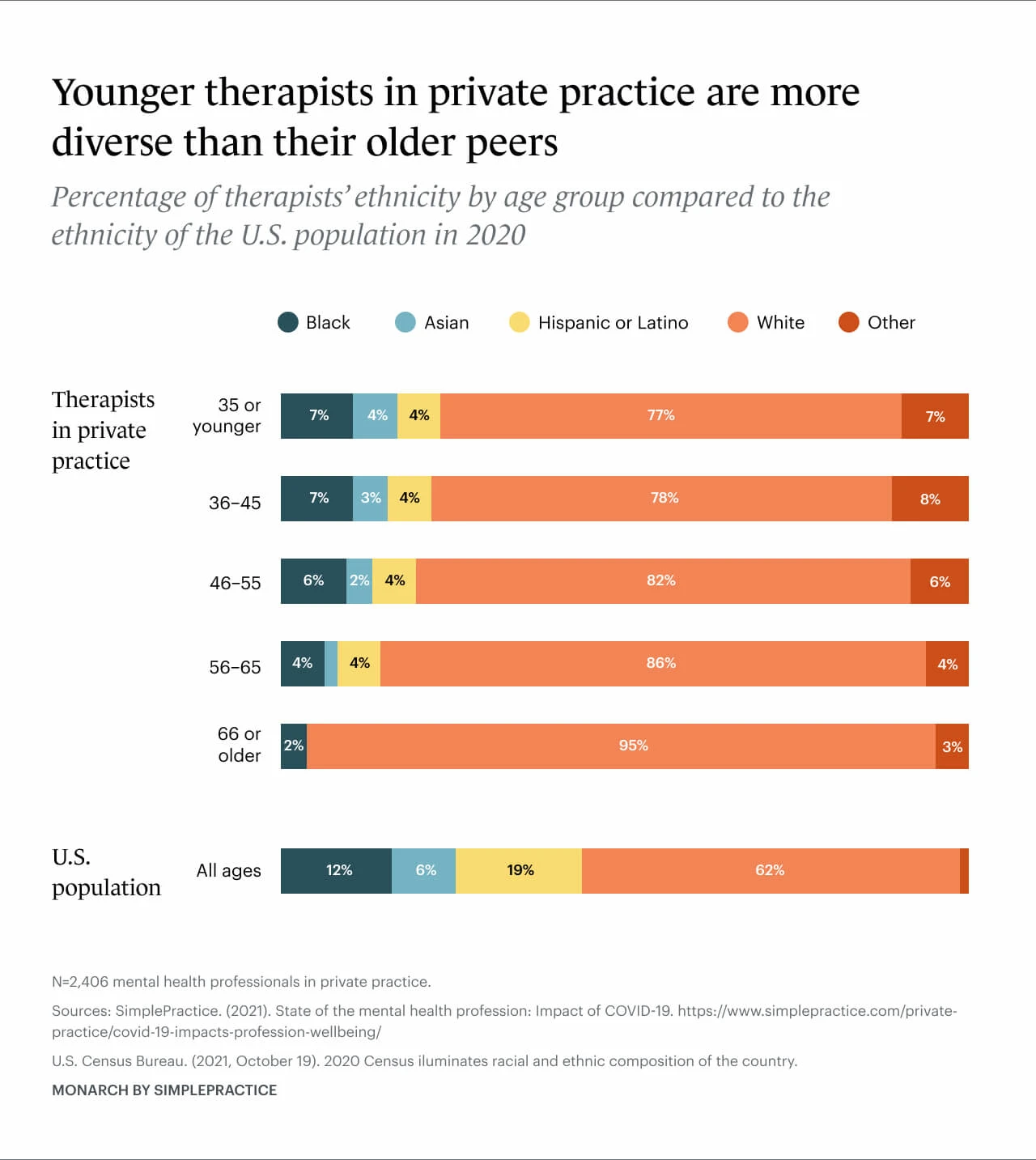
In addition to finding a slightly higher than average percentage of Black therapists on the SimplePractice platform, another silver lining this research uncovered is that younger American therapists are much more diverse than their older peers.
Reasons contributing to a lack of Black therapists
If you’re one of the thousands of people searching for a Black mental health therapist nearby, you're probably wondering: Why aren’t there more Black therapists?
Let's take a look at some of the potential barriers and contributing factors.
Stigmatization of therapy and lack of exposure
Among Black Americans, the search for help often begins with the church and in faith practices where there may be spiritual care, but not necessarily qualified, nor licensed, mental health guidance.
"Some problems go beyond faith—emotional challenges or psychiatric challenges that require help from outside [the church]."
"The church has a different skillset—you're not talking about licensed mental health professionals," says psychologist Shane Perrault, Ph.D., founder of African American Marriage Counseling.
"Some problems go beyond faith—sometimes people have emotional challenges or psychiatric challenges that may require help from outside [the church]," he says.
Clinical psychologist LaToya Gaines, Psy.D, points out the "stigmatization of therapy" within the Black community.
In fact, a 2013 study in Nursing Research found 63% of Black respondents believed admitting mental health issues was a sign of weakness.
"The only depiction people see of therapists, and the work we do, is through movies or television,” says Gaines. “And that is most often not an accurate portrayal of what therapy is and what therapists do."
According to Gaines, as a result of this lack of exposure, many Black Americans do not seek careers as therapists.
Cost of psychology education and licensing
It’s no secret Black American families have, historically, earned less than their White counterparts.
For example, a 2019 Payscale online salary study found African American men make 87 cents for every dollar White American men earn.
Additionally, according to the 2020 U.S. Census, the median annual salary for African American adults was $46,000. And, among the major racial groups, Black Americans had the highest poverty rate at 19.5%.

While the total costs related to pursuing a degree program in psychology vary according to location, including cost of living, and specific school (and particularly public vs. private colleges and universities), there is a significant cost associated with the education and licensing tests.
For example, America’s best psychology programs, as ranked by the U.S. News & World Report in 2017, range in annual tuition costs—from $15,000+ (for in-state residents) to over $40,000 (non-residents) for public schools—and roughly $45,000+ for private institutions.
Ginger Dean, psychotherapist and founder of Loving Me After We, says, even though psychology is technically in the science department, it's not promoted as heavily today in higher education as the core STEM fields (science, technology, engineering, and math).
“Becoming a therapist or healer isn't as attractive to people who will end up taking on the same amount of student loans as the people who go into [more lucrative] STEM occupations—especially [when therapists] are [earning so much less],” Dean explains.
“So, if potential students and social workers and psychologists and therapists are running the numbers from a student loan [cost] perspective, the numbers just don't add up,” she says.
Discrimination in hiring practices
Workplace and hiring discrimination are rampant across many industries and fields.
A study conducted by the Harvard Business Review found that, since 1990, White applicants have received about 36% more callbacks than Black applicants with identical resumes—and that number hasn't declined in 30 years.
Psychologist and University of Kentucky assistant professor Candice Nicole, Ph.D., says she hasn’t experienced discrimination herself, but she emphasizes it's because there were Black professors already in the department when she applied.
"They advocated for me," she explains. "After five years, all of my colleagues are impressed with my success and accomplishments, but it took a Black woman professor urging them to interview me."

Research typically focuses on White study participants
A 2015 commentary published in “PLoS Medicine” points out that fewer than 5% of respiratory studies funded by the National Institute of Health included reports on racial or ethnic minorities
Additionally, fewer than 2% of studies funded by the National Cancer Institute have met diversity goals.
The media has raised this topic in recent years.
The Atlantic published a 2016 piece “Why Are Health Studies So White?”
And a 2018 Scientific American article headlined "Clinical Trials Have Far Too Little Racial and Ethnic Diversity," points out that patients who participate in clinical trials for new drugs are 80%-90% White, while nearly 40% of Americans today belong to a racial or ethnic minority.
"We live in a society that centers a White worldview," says Jardin Dogan, therapist and founder of @blkfolkxtherapy. "The founding fathers of psychology were White men, and—therefore—most psychological theories and assessments make White voices the norm, rendering voices of Color inaudible and our experiences unimportant."
Biases with standardized tests required for licensing
Passing standardized tests are requirements on the path to becoming a licensed therapist or counselor in the U.S.
Licensing examinations vary by state, and the most common examinations required for licensure are the Examination for Professional Practice in Psychology (EPPP), which psychologists must pass to practice in America and most of Canada, the National Counselor Examination (NCE) and the National Clinical Mental Health Counselor Examination (NCMHCE)—both administered by NBCC.
According to Dogan, like many other standardized tests, including the SAT, ACT, and GRE, these mental health licensure exams are not free of racial bias.
In fact, a 2018 survey by the American Psychological Association (APA) showed "White psychologists were significantly more likely to pass the EPPP the first time they took the test than psychologists of color."
The APA research also found that White psychologists were slightly more likely to earn Ph.D. degrees, while people of color were more likely to earn Psy.D. degrees.
White psychologists were significantly more likely to pass the EPPP the first time they took the test.
"Research suggests the likelihood of passing these exams is related to race and ethnicity—indicating racial gaps in testing outcomes," says Dogan.
"Further, there have been reports that White psychologists found the Examination for Professional Practice in Psychology (EPPP) course and test prep materials more helpful than psychologists of color," she says.
The APA's 2018 findings are in alignment with Dogan's assertion.
Therapist and owner of Art of Peace Wellness in Charlotte, Chantia Carter, LCSW, teaches a course to help pre-licensed therapists prepare for and pass state board exams.
“At the beginning of the pandemic, they were saying if you were an African American fully licensed therapist, and you had test questions or materials that might help African Americans—to present them to the board," she shares, addressing the cultural bias of the exam questions. "They were trying to add questions that would equalize [and ensure fairness].”
Education centered on the White experience
Dogan points out that she had to sign up for a separate specialized course in her doctoral program to learn more about Black psychologists and theorists.
Gaines also notes most counseling programs are taught from a Eurocentric perspective.
"Diversity is relegated to one course or one class on the syllabus," she says. "Counseling theories do not consider the racial, cultural, social, political factors that intersect to contribute to the mental health issues of Black people."
This leads to a lack of retention for Black students in higher education, according to Gaines.
"It increases the likelihood that many students of color will experience microaggressions and racism—which are difficult to deal with, at baseline—and even worse without the support of faculty of color,” she says. “And it can cause some students to withdraw from programs altogether."

Lack of Black mental health mentors
Nicole points out non-Black professors can be uninterested in studying the topics Black students would like to research.
“Even when they're interested in these topics,” she says, “They may be inadequately prepared to mentor Black students.”
According to Dogan, there needs to be a stronger pipeline of psychologists of color that teach, train, and mentor younger mental health professionals.
More Black psychology faculty means more Black therapists—which could mean more Black mental wellness.
If more Black people enter the mental health profession, Gaines says it increases the potential for them to become faculty and provide more mentorship to trainees.
More Black psychology faculty means more Black therapists—which could mean more mental wellness for Black Americans.
Need help finding a Black therapist?
The Monarch Directory by SimplePractice is an online mental health platform that makes it easy to find and book a therapist near you.
Meet for in-person sessions or choose to see a counselor who offers telehealth video therapy appointments.
Search for therapists by insurance provider, location, specialty, and more.
You can even view open availability in therapists' schedules and request an appointment online—often without ever needing to pick up the phone.
If you're one of many folks searching for a Black therapist nearby, you can enter your location, and narrow down your selections from there.

For example, if you’re looking for a Black therapist in NYC, you can use Monarch to browse all the therapists in New York City and choose a Black mental health practitioner such as Clotilde Simons, Joan E. Brown, Mychelle Williams, and others.
Similarly, if you need to find a Black therapist in Houston, you can check out all therapists in Houston.
From there, you can view profiles of Donetta Shelby, Bianca Simmons, Kindall C. Tyson, Andrea Daniels, and more.
Finally, if you’re seeking a Black therapist in Chicago, browse through the list, and view the profiles of Jokae Ingram, Marcus Moore, Brenda Reavis, and others.
You can also filter your search by keywords like anxiety, depression, or grief.
For example, you can view all therapists in Oakland who specialize in depression. Then look into Sherice Youngblood, Sonya Brewer, and more.
READ NEXT: How to Pay for Therapy
About the authors:
Caron LeNoir is an American journalist, producer, artist, and activist. She's the founder of CARONISMedia Group, The Center for Sensual Arts, and a proud Navy veteran. Her experience informs her advocacy for women, women veterans, and mental health.
Jess Barron is Monarch's Editor-in-Chief. She's spent the past 25 years working in online journalism and digital wellness. Jess's writing has appeared on Yahoo! News, Headspace, Fortune, LIVESTRONG.COM, Entrepreneur, Sleep.com, and more. Connect with Jess on Linkedin, on her blog, and on Twitter @jessbeegood.
Searching for a great therapist? Check out the Monarch Directory by SimplePractice to find therapists near you with availability and online booking.
Bowman, N., & Ameen, E. (2018). Exploring differences in pass rates on the Examination for Professional Practice in Psychology. American Psychological Association. Retrieved from https://www.apa.org/pi/oema/resources/communique/2018/06/pass-rates
Census Bureau. (2019). QuickFacts: United States. Retrieved from https://www.census.gov/quickfacts/fact/table/US/PST045219
Kugelmass, H. (2016). "Sorry, I’m not accepting new patients" an audit study of access to mental health care. Journal of Health and Social Behavior, 57(2), 168–183. Retrieved from https://doi.org/10.1177/0022146516647098
Lin, L., Stamm, K., & Christidis, P. (2018, February). How diverse is the psychology workforce? Monitor on Psychology, 49(2), 19. Retrieved from https://www.apa.org/monitor/2018/02/datapoint
McIntosh, K., Moss, E., Nunn, R., & Shambaugh, J. (2020). Examining the Black-White wealth gap. Brookings Institution. Retrieved from https://www.brookings.edu/blog/up-front/2020/02/27/examining-the-black-white-wealth-gap/
Meyer, O. L., & Zane, N. (2013). The influence of race and ethnicity in clients’ experiences of mental health treatment. Journal of Community Psychology, 41(7), 884–901. Retrieved from https://doi.org/10.1002/jcop.21580
Miller, S. (2020). Black workers still earn less than their white counterparts. SHRM. Retrieved from https://www.shrm.org/resourcesandtools/hr-topics/compensation/pages/racial-wage-gaps-persistence-poses-challenge.aspx
Novotney, A. (2017). A growing wave of online therapy. American Psychological Association. Retrieved from https://www.apa.org/monitor/2017/02/online-therapy
Quillian, L., Pager, D., Midtboen, A., & Hexel, O. (2011). Hiring discrimination against Black Americans hasn’t declined in 25 years. Harvard Business Review. Retrieved from https://hbr.org/2017/10/hiring-discrimination-against-black-americans-hasnt-declined-in-25-years
SimplePractice. (2021, December 10). State of the mental health profession: Impact of COVID-19. Retrieved from: https://www.simplepractice.com/private-practice/covid-19-impacts-profession-wellbeing/
Stallings, E. (2020, July 16). Black therapists, in higher demand than ever, are stretched thin. Elemental. Retrieved from https://elemental.medium.com/how-are-black-therapists-doing-right-now-c834287edbb6
Vance, T. (2019, February 8). Addressing mental health in the Black community. Columbia University Department of Psychiatry. Retrieved from https://www.columbiapsychiatry.org/news/addressing-mental-health-black-community
Ward, E. C., Wiltshire, J. C., Detry, M. A., & Brown, R. L. (2013). African American men and women’s attitude toward mental illness, perceptions of stigma, and preferred coping behaviors. Nursing Research, 62(3), 185–194. Retrieved from https://doi.org/10.1097/nnr.0b013e31827bf533


